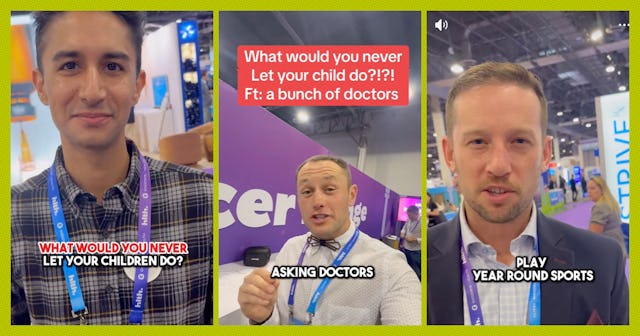Here's What A Group Of Doctors Say They Would Never Let Their Children Do
Some of their answers were surprising!

At a recent convention, Tommy Martin, M.D., polled some other doctors to get their opinions on what they would never let their kids do. From safety to sports to eating habits, these doctors had some pretty interesting insights into how to best care for our kids today.
The first doctor interview, Dr. Jeremey, focused his answers on sports and extracurricular activities. He said he would never have his kids play year-round sports, train more hours per week than their age, or do anything that they didn't consider fun.
Dr. Oase, an emergency medicine doctor, said he would never let his kids ride a scooter without a helmet, be unsupervised around a pool, or use an ATV in any capacity.
“I've seen bad, bad things happen,” he said.
Another medical professional, Dr. Leah, focused her list on online safety.
She said she would never let her kids be on YouTube unsupervised or have social media profiles at a young age. She also added that she would never let her kids take supplements that she didn't know the long-term effects of.
Dr. Jenaeja, an oncologist, says she doesn’t want kids to always be out in the sun.
“Especially because we're a bunch of beach people, without some kind of sunscreen, for many reasons, but of course, skin cancer is a very real thing,” they said.
“Number two, I at least want them to know the difference of healthy eating and not. So even though we do fast food, my wife and I are both oncologists, I need to make sure they understand that this is not the nutritional capacity that good greens and vegetables and fruits can be.”
He continued, “And number three, as a cancer doctor, when it's age appropriate, at least have a discussion about the guideline-recommended stuff. So there's obviously very real vaccines against HPV, which can cause head and neck cancers and cervical cancers, as well as screening for cancers, which hopefully AI will really accelerate how many things we can do for screening and prevention, and even potentially at an earlier age.”